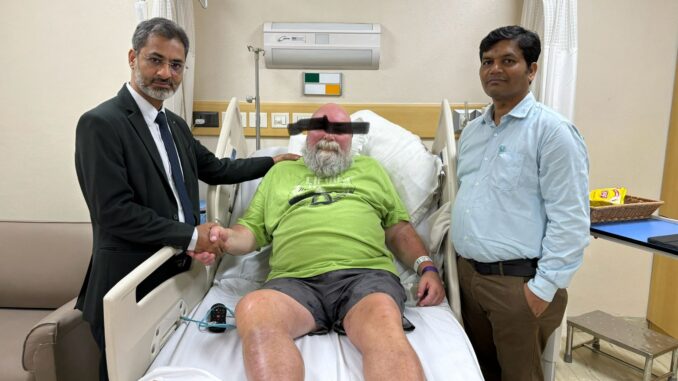
By: Rajiv Tewari, based on inputs by the treating Surgeon Dr Shafiq Ahmed, Director Urology, Robotic Urology, Uro-Oncology, Andrology & Robotic Renal Transplant at BLK-MAX Super Speciality Hospital
Penile implant surgery is often compared with knee replacement means if joint is not working it can be replaced. Same holds true for penile implant. Our Australian patient came to us for penile implant with a lot of trust in India. He underwent Rigi-10 American penile implant. We are wishing him a very happy marital life after a successful penile implant.
Penile implants are devices placed inside the penis to for erectile dysfunction (ED) in men. This is done to get an erection. Penile implants are recommended only after other treatments for ED fail.
Though penile implants follow an invasive treatment procedure yet most of the case studies indicate that most men and their partners have reported satisfaction with the devices. Penile implants have the highest rate of satisfaction of all erectile dysfunction treatments however it’s necessary to choose for all patients to understand the procedure as well as the risks involved.
We have two types of implants:
1. Malleable implant
2. Inflatable implant.
The cost for malleable implant is 8k and inflatable 19k for international patients. The advantages of each of these two implants are usually explained by the treating surgeon as this differs on a case to case basis. Lifelong warranty is given by most of the companies yet like all other devices sometimes malfunction can occur in these devices too so it’s very important to go by the previous experience of your treating doctor.
In most cases, erectile dysfunction can be treated with medications or use of a penis pump (vacuum constriction device). So surgery is recommended after other procedures do not produce the right results. Penile implants are also used to severe cases which may cause scarring inside the penis leading to curved and painful erections. This is known as the Peyronie’s disease.
Penile implants aren’t for everyone such as those with urinary tract infection, pulmonary infection, and severe cases of diabetes or heart disease so it’s very important to consultant a specialist & experienced doctor before taking a decision to go for surgery.
Just like any other surgery your doctor will also brief you on the associated risks such as the after effect of poor quality or malfunctioning of the implant. So it’s very important to check the track record and experience of the past patients before choosing your surgeon.
Necessary steps to be followed by a patient before taking a decision:
1. First step is always to consult your healthcare provider or the physician who will review your medical history. Past medications and all the symptoms need to be recorded and shared in advance especially if one is coming to India from another country. This will also ensure that your healthcare provider has considered other treatments and then recommended you for surgery. Further tests if required will be done in India also to be doubly sure that you need a surgery.
2. Check out the credentials of the doctor by visiting the hospital web site and doing some google search.
3. Check out the credentials of the hospital by visiting their site to find out the technology capabilities in terms of equipment and also the back up support as sometimes other complications may arise needing the support of specialized staff and great doctors from other specialities.
4. Your healthcare provider or the treating doctor should explain to you in detail on the possible risks and post- surgery care based on his past experience which is also an important check about the capability of your doctor.
5. You must discuss your expectations with your doctor and ask questions about the procedure involved and type of implant that will suit you the best. You may also check out the earlier cases managed by your treating doctor.
For an appointment with Dr Shafiq Ahmed simply click here.
